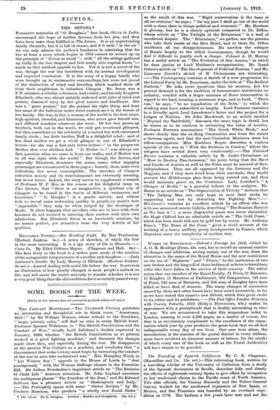SOME BOOKS OF THE WEEK.
Wolice in this column does not necessarily preclude subsepteal testes
Taz JANUARY MONTHLIES.—The Nineteenth Century publishes an interesting and thoughtful ode in blank verse, " Americans, Hail ! " by Sir William Watson, whose tribute to the President, " large, patient, calia," will find an echo in every British heart. Professor Spenser Wilkinson, in " The British Constitution and the Conduct of War," recalls Lord Salisbury's doubts expressed in January, 1900, whether " the British Constitution as at present worked is a good fighting machine," and discusses the changes made since then, and especially during the war. He disapproves of the present War Cabinet as a machine, and concludes that " a Government that seeks victory must begin by entrusting the conduct of the war to men who understand war." Mrs. Humphry Ward, in " Let Women Say ! " appeals to the House of Lords to " deal courageously " with the Woman Suffrage clauses in the Franchise Bill. Sir Arthur Newsholme's important article on " The Enemies of Child Life " deserves attention. Mr. John Leyland examines the ambiguous phrase " The Freedom of the Seas," and Sir Edward Sullivan has a pleasant article on " Shakespeare and Italy." —The Fortnightly opens with some " Obiter Scripts " by Mr. Frederic Harrison, who predicts a wholly new Social Order
• The Setons, By 0. Douglas. London : Hodder and Stoughton. [tie, net.) as the result of this war. " Rigid conservatism is the bane cm all revolutions," he says ; ." for my part I shall go out of the world
with a dean slate in things political and economic." Mr. Harrison is gloomy, but he is a cheery optimist compared to Dr. Dillon. whose article on "The Twilight of the Ritzonians " is a wail of unrelieved despair. The " Ritzonians," we gather, are the persons who take their meals at the Ritz Hotel, and to them Dr. Dillon attributes all our disappointments. He ascribes the collapse
of Russia largely to the Allied Governments, though he would find it difficult to justify such a charge. Colonel A. M. Murray has a useful article on " The Evolution of Our Armies," in which he does justice to Lord Haldane's reorganization. Mr. Israel Cohen's article on " The Development of Political Zionism " and Mr. Laurence Jerrold's sketch of M. Clemenceau are interesting. —The Contemporary contains a sketch of a new programme for the Liberal Party by Mr. Runciman, under the title of " The Radical Outlook." He asks more questions than he answers, but his general demand is for the abolition of bureaucratic) restrictions on industry, coupled with a larger measure of State intervention in regard to the land, housing, a minimum wage, and so forth. " There can," he says, " be no repudiation of the Debt," to which the working men have subscribed so largely. Lord Parmoor examines in a friendly spirit Lord Lansdowne's letter and the project for a League of Nations. Sir John Maodonell, in an article entitled " Beyond the Battlefield," discusses the same topic in detail, but he warns us to be cautious in estimating the value of treaties. Professor Burrows summarizes " The Greek White Book," and shows clearly that the ex-King Constantine was from the outset a German agent, and that the anti-Venizelist Ministers were his fellow-conspirators. Miss Kathleen Royds describes a curious episode of the war in " With the Serbians in Corsica," where the refugees have settled down very comfortably.—The National Review contains a valuable article by M. Andr4 Ch6radame on " How to Destroy Pan-Germany," his point being that the Slava and Czechs of Austria as well as the Poles must be assured of their independence. They are all oppressed by the Germans and the Magyars, and if they were freed from their servitude, they would prevent the Mitteleuropa plan from being carried out, and thus would maintain peace on the Continent. Lady Lowther's " A Glimpse of Rodin " is a graceful tribute to the sculptor. Mr. Maxse in an article on " The Organisation of Victory " declares that " The Talking Men can only hope to save their necks by supporting and not by thwarting the Fighting Men."— Blackwood's contains an excellent article by an officer who was with our armoured cars in Galicia, describing " The Russian Retreat as We Saw it " ; a more disgraceful panic was never chronicled. Sir Hugh Clifford has an admirable article on " The Gold Coast," which has been made rich not by gold but by cocoa. Mr. Anthony Penn's " The Brain of the Guns " gives a vivid account of the working of a heavy artillery group headquarters in France, whioh illustrates anew the complexity of modern war.


































 Previous page
Previous page